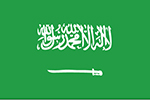
Population
35M+
CHRISTIAN PERSECUTION STATUS
high
Persecution
CHRISTIAN POPULATION
6%
Status of
the church
Every citizen of Saudi Arabia is expected to be a Muslim, and it is the only country in the world with no church buildings. Around 85-90 percent of citizens are Sunni, and 10-15 percent are Shia. Almost a third of residents are foreigners, including 1.2 million Christians.
Both Leaving Islam and committing blasphemy are legally punishable by death, but only lesser sentences have been enforced in recent years. The public practice of any other religion is forbidden. Christian foreign residents worship privately and are at risk of raids, although certain denominations hold services without interference. Converts often follow Jesus secretly for fear of pressure from family and the authorities.
Women are very restricted in several ways. Saudi Arabia is the only country in the world where women are not allowed to drive. Women also require male permission for activities, such as traveling abroad, having surgery, and opening a bank account. Saudi Arabia has ranked in the bottom ten countries in the world for gender parity, with human rights activists claiming that practices such as child marriage impede education and any possible improvement in the status of women.
All broadcast media are state-owned and controlled. There are approximately 9.7 million internet users in Saudi Arabia (CIA World Factbook), and blogging on the internet requires prior registration with the government. Internet streams are also heavily monitored by the state, which denies access to many sites.
Location
Prayer points
What our viewers are saying